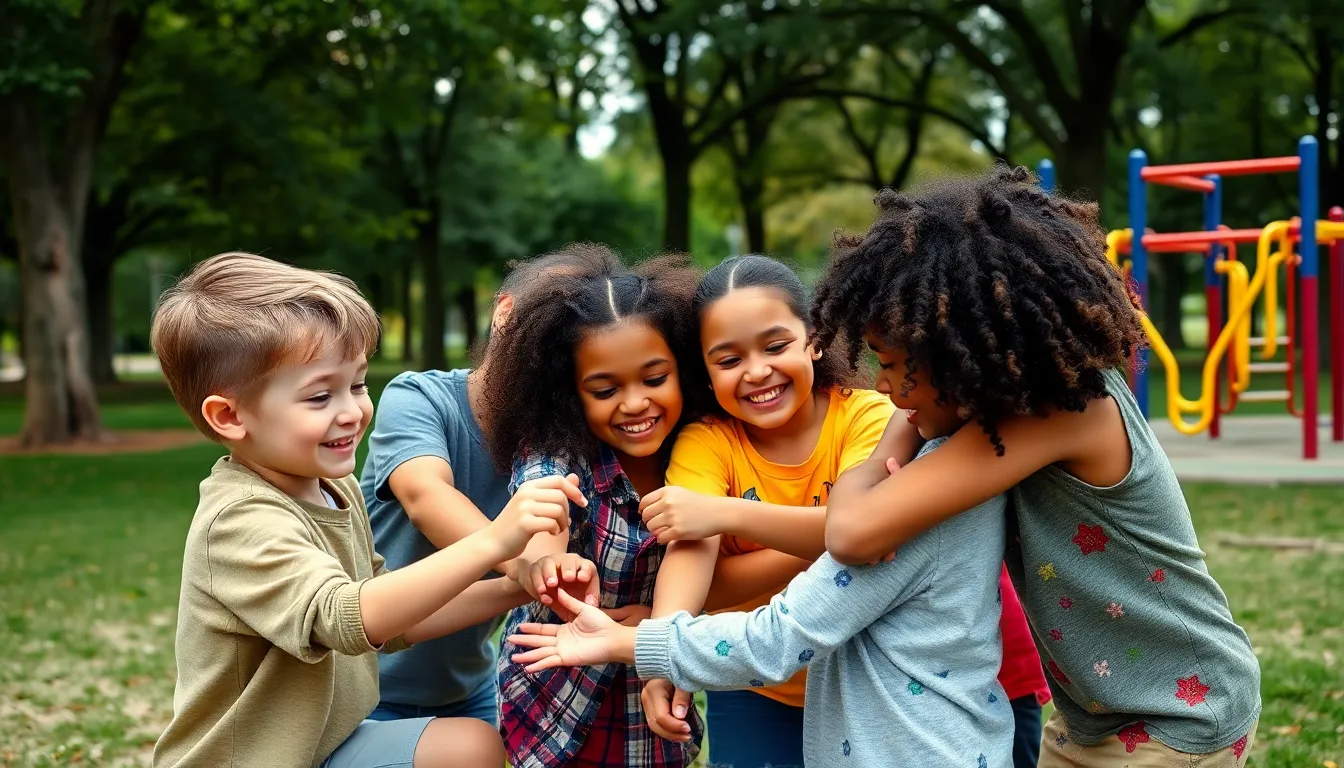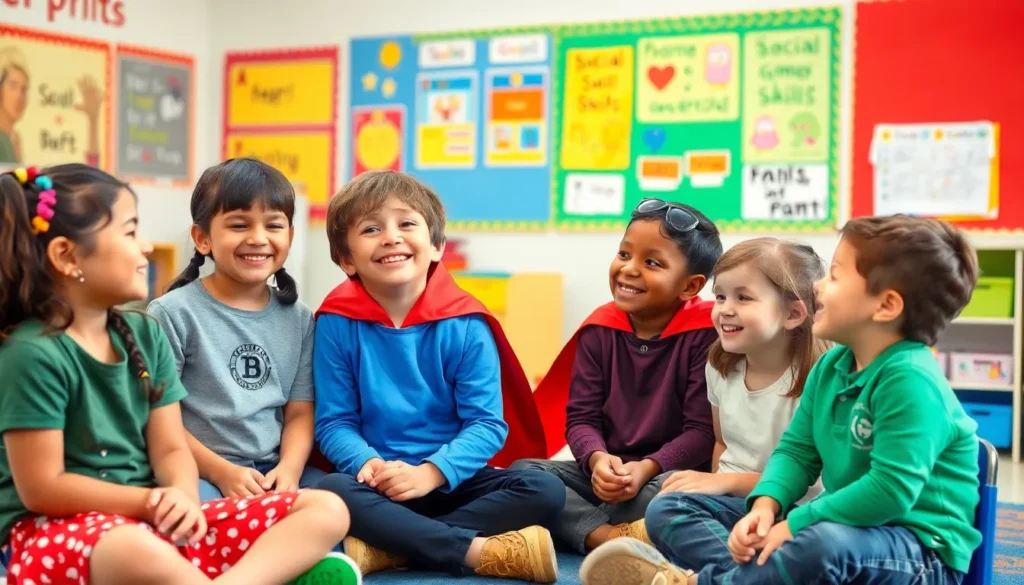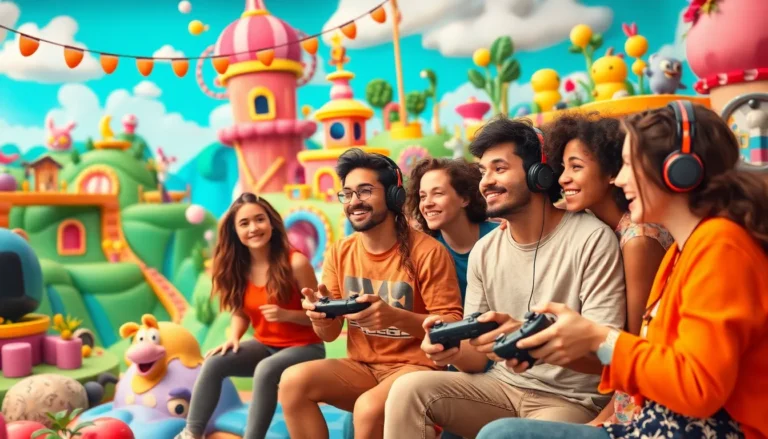Table of Contents
ToggleIn a world where emojis often replace words and social media likes can feel like a warm hug, teaching kids essential social skills is more important than ever. Think of it as giving them a superhero cape that helps them navigate friendships, resolve conflicts, and even master the art of small talk—because let’s face it, nobody wants to be that kid who talks to the wall at the school dance.
Overview of Social Skills for Kids
Social skills play a crucial role in a child’s development, especially in today’s digital age. Communication often happens through emojis or social media, making face-to-face interactions more valuable. Building friendships requires the ability to engage in small talk, express emotions clearly, and share experiences. Conflict resolution is another essential area; children must learn how to navigate disagreements and find common ground with peers.
Developing empathy strengthens relationships. Children need to understand and respond to others’ feelings appropriately. Practicing active listening skills enhances understanding, allowing kids to grasp different perspectives effectively. Nonverbal cues, such as eye contact and body language, also contribute to successful interactions.
Role-playing can help teach these skills in fun, engaging ways. Kids can practice scenarios that involve sharing, taking turns, or apologizing. Real-life experiences, such as group activities or playdates, provide opportunities for applying social skills in context. Continuous reinforcement from parents and educators ensures gradual improvement.
Monitoring progress helps identify areas that may require additional focus. Tracking how often children share feelings or initiate conversations can inform strategies for further development. Introducing social skills training at a young age reduces the likelihood of social awkwardness and enhances overall confidence.
Prioritizing these essential abilities equips children with the tools they need to navigate an increasingly complex social landscape. Establishing a strong foundation in social skills leads to lasting relationships and improved emotional intelligence throughout life.
Importance of Social Skills in Childhood

Social skills play a vital role in childhood development, enabling kids to navigate their environments effectively. These skills foster positive interactions and facilitate meaningful connections with peers.
Building Relationships
Building relationships starts with understanding emotions. Kids learn to form friendships through shared experiences and open communication. They develop trust by expressing feelings honestly and showing empathy towards others. Participation in group activities enhances their ability to collaborate and support their peers. Engaging in play promotes cooperation, teaching children to navigate social dynamics. Recognizing and responding to social cues strengthens bonds, making interactions more fulfilling. Strong relationships contribute to emotional resilience, enabling children to cope with challenges and setbacks.
Enhancing Communication
Enhancing communication skills serves as a foundation for effective expression. Children learn to articulate thoughts clearly, which fosters clearer conversations. Practicing active listening leads to improved understanding and reduces misunderstandings. Kids become more adept at using nonverbal cues; gestures, expressions, and body language convey important messages. Honing conversational skills allows them to engage in small talk comfortably. Expressing gratitude and assertiveness builds confidence in social settings. Ultimately, strong communication skills pave the way for success in various aspects of life, including academics and future careers.
Key Social Skills Every Child Should Learn
Teaching social skills to children significantly contributes to their development in today’s interconnected world. Essential skills, such as active listening, empathy, cooperation, and conflict resolution, empower kids to engage meaningfully with others.
Active Listening
Active listening plays a pivotal role in effective communication. This skill requires children to focus completely on the speaker, demonstrating interest through eye contact and nodding. They interpret verbal and nonverbal cues accurately to understand the message conveyed. Practicing active listening helps kids respond thoughtfully, fostering deeper connections. Engaging in conversations that require summarizing points encourages this skill further, making interactions more enriching. This practice not only enhances relationships but also boosts children’s confidence in social situations.
Empathy
Understanding emotions marks the foundation of empathy. Children learn to appreciate different perspectives and feelings by recognizing someone else’s emotional state. Engaging in discussions about emotions helps clarify how others might feel under various circumstances. Role-playing activities provide excellent opportunities for kids to walk in someone else’s shoes, enhancing this understanding. Experiencing compassion toward others promotes kindness, which strengthens friendships. Developing empathy allows children to navigate social dynamics more effectively, creating supportive environments.
Cooperation
Cooperation emphasizes teamwork and collaboration among peers. Group activities foster skills like sharing responsibilities and compromising to achieve common goals. Through collaboration, children learn to appreciate different viewpoints and collaborate towards shared interests. Participating in team sports or group projects teaches kids the importance of working together. Encouraging open dialogue in group settings allows them to express their ideas and listen to others, further reinforcing this skill. Developing cooperative abilities is essential for success in school and future professional environments.
Conflict Resolution
Conflict resolution equips children with the tools necessary to navigate disputes. Understanding that conflicts arise naturally is the first step toward managing them effectively. Teaching strategies like calm discussions and identifying solutions empowers kids to address disagreements constructively. Role-playing real-life scenarios helps practice these techniques in low-pressure situations. Reinforcing the importance of listening to opposing views during conflicts aids in finding common ground. As children refine their conflict resolution skills, they contribute to healthier relationships and peaceful interactions.
Strategies to Develop Social Skills
Children thrive in social settings with effective strategies that nurture their interpersonal abilities. Prioritizing targeted activities enhances their social competence.
Role-Playing
Role-playing scenarios provide children with a safe space for practicing social interactions. Engaging in different roles, kids can explore various social situations while gaining confidence in expressing their thoughts and emotions. This approach fosters empathy by allowing children to step into others’ shoes, understanding different perspectives. Parents and educators can introduce role-playing games centered around everyday situations, reinforcing the importance of communication skills. Take advantage of simple scripts or improvisational exercises to encourage spontaneity. Practicing these skills in a supportive environment leads to improved interactions in real-life contexts.
Group Activities
Participation in group activities is essential for developing social skills. Kids learn to cooperate and collaborate with peers while engaging in shared tasks or sports. Through these experiences, they cultivate teamwork and communication skills crucial for building relationships. Group activities teach children how to navigate conflicts and appreciate diverse viewpoints, enhancing their emotional intelligence. Structured play allows children to practice initiating conversations and resolving disagreements. Encourage participation in clubs, team sports, or creative projects to foster these important abilities, ultimately enriching their social experiences.
Positive Reinforcement
Positive reinforcement plays a pivotal role in nurturing social skills. Recognizing and rewarding children’s efforts when they demonstrate effective social behaviors encourages continued growth. Simple praise or tangible rewards can motivate kids to engage in desired behaviors, such as sharing or active listening. Consistency is key; parents and educators should provide feedback immediately after an interactive experience. Creating a supportive atmosphere where mistakes are seen as learning opportunities fosters resilience. This approach not only solidifies social skills but also boosts children’s self-esteem, empowering them to navigate their social environments with confidence.
Mastering social skills is crucial for children’s growth in today’s interconnected world. By fostering these abilities early on, kids can navigate social situations with confidence and ease. The development of empathy active listening and conflict resolution equips them to build meaningful relationships and handle challenges effectively.
Engaging in role-playing and group activities allows children to practice these skills in a supportive environment. Continuous encouragement from parents and educators plays a vital role in reinforcing positive behaviors. As children learn to express themselves clearly and understand others’ emotions they not only enhance their social interactions but also lay the groundwork for future success in various aspects of life. Investing time in teaching social skills today will yield significant benefits for children as they grow and thrive.







